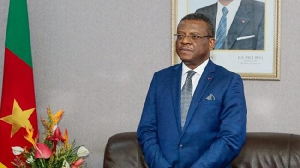A Press Release of June 16, 2016, by the Cameroon Bar Council ‘vehemently condemns the translation disparity between the French and English versions of the Penal Code bill introduced in the June 2016 Parliamentary session.
The release fears that the unprofessional translation would result in the divergence in interpretation and the likelihood of misinterpretation and application of the said bill with the probability of creating chaos in the administration of justice.
The date of the issuance of the press release coincides with the International Day of the Child observed worldwide in memory of the eleven-year-old Hector Peterson and his more than 60 friends who were massacred in Soweto, South Africa, for standing up in arms against the imposition of Afrikaans language in their educational system.
In a terse opinion in The Post newspaper of February 15, 2016, captioned “Cameroon as French Bilingual country”, Yerima Kini Nsom states inter alia; “It has become an unwritten law that almost all the official documents in Cameroon appear only in French.
Nobody cares a damn as to the fact that those who speak, read and understand only English are cheated of their right to information”.
The Cameroon Education Forum observes in a Reflection Document produced early this year that, “Government policy on bilingualism does not take into consideration the bicultural nature of the country in many respects.”
In an interview granted The Post newspaper on January 15 2016, Honourable Senator Nfon Victor Mukete of the ruling CPDM party is quoted as saying that the Constitution of Cameroon gives Anglophones equal rights to their language, but he has found it difficult to understand why the Government cannot accord Anglophones the right to be fully informed of State issues in their own language - the English language.
Nfon Mukete recalled that he had written to the Prime Minister and copied the Head of State on the need for the state-owned newspaper, Cameroon Tribune, to be published in English and French.
On Wednesday, March 27, 2015, Honourable Cyprian Awudu Mbaya, Social Democratic Front Member of Parliament, ripped off notices in the State-owned Hotel Ayaba in Bamenda because all signage and information notices were written only in French.
The MP pulled down these monolingual notices, because, to him, Cameroon cannot be a bilingual country yet notices at public places in Anglophone Regions are written only in French.
Lest we forget, in early 2000, the late writer, Sango Mbella Sonne Dipoko, had rubbed red paint on the road signs in the Tiko Municipality that were all written in French.
Dr. Peter Wuteh Vakunta, in his seminal paper titled; “Linguistic Apartheid and the quest for freedom and identity in Cameroon” (December 14, 2014) argues that “official bilingualism in Cameroon has been treated with such levity that it has virtually been rendered dysfunctional.”
He further attributes this to the absence of an institution that can be charged with the implementation of the nation’s bilingual policy.
The Post newspaper of October 10, 2014, carried the banner: “Biya shocks Commonwealth with speech in French.” Of course, more shocking is the fact that in our 55 years as a bicultural country, no Executive State address has ever been delivered in English before being translated and read by someone else in French.
On March 9,1990, I was arrested and detained for two weeks in the Brigade Mixte Mobile (BMM) cell in Ekondo Titi for writing a memorandum to the effect that the then Minister of National Education, Joseph Mboui, addressed Anglophone students of Government High School Mundemba entirely in French.
Granted, more Ministers today switch between English and French than it was the case some 20 years ago. But there is a difference between individual bilingualism as an option and State bilingualism as a policy.
Petitions, picketing, lone-range crusading, policy dialogue meetings, media articles, reports, group advocacy campaigns and memorandums have been addressed to the Government of Cameroon to respect Article 1 (3) of the country’s Constitution and Presidential decree of 1996, which both emphasise that all official documents for public consumption shall be in English and French.
What all these advocacy campaigns suggest is that, to quote Dr. Peter Wuteh Vakunta, Cameroon’s official bilingual policy is a mere statement of intent. Though strongly articulated in official policy documents, Cameroon’s bilingual policy remains a mere manifesto on paper.
(To be continued)
*(Mwalimu George Ngwane is a Chevening conflict management Fellow, York, UK (2010), Rotary Peace Fellow, Bangkok, Thailand (2015), Commonwealth Professional Fellow, London, UK (2015), writer and Author of a forthcoming book “Diary of a Dismissed Delegate”.www.gngwane.com)
Opinions of Saturday, 2 July 2016
Auteur: Mwalimu George Ngwane














